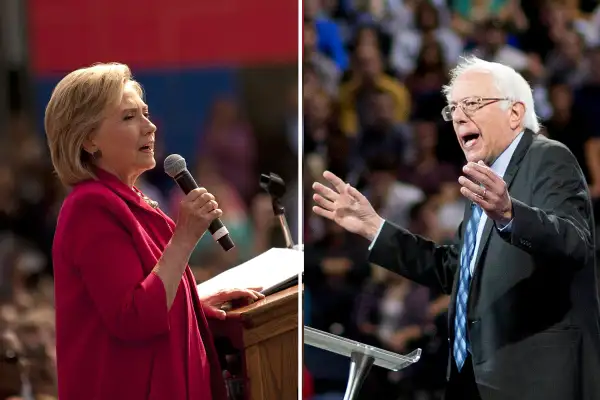What You'll Hear About Your Money During Tonight's Debate

With just a third of the GOP's number of presidential wannabes, only two candidates polling in the double digits, and no Donald Trump, the Democratic party's first presidential debate of the 2016 election cycle probably won't draw anywhere near the 23 million and 24 million viewers who watched the first and second Republican debates, respectively.
But those who do tune in to CNN on Tuesday evening at 8:30 p.m. ET can expect a good amount of talk about their money from Lincoln Chafee, Hillary Clinton, Martin O'Malley, Bernie Sanders, and Jim Webb.
Income inequality and the struggle of the American middle class have been a core focus of the Democratic race thus far—and tonight, the candidates will no doubt be asked to define and defend their positions and proposals.
Here are the big money questions they'll face, and what to watch for in their answers.
The minimum wage
The debate among the five Democratic candidates will not be whether to raise the minimum wage, but how much.
While Bernie Sanders and Martin O'Malley are both vehement proponents of the "Fight for 15" campaign—the goal of which is to raise the minimum wage nationwide to $15 per hour by 2020—Hillary Clinton said in late July that she thinks that number is too ambitious.
Aligning herself with left-leaning economists who think a $15 federal wage floor could bring about huge layoffs (especially in less densely populated areas where the cost of living doesn't necessarily demand it), Clinton has instead argued for $12. She does, however, support the $15 minimum in specific cases—for fast food workers in New York, for example. She'll likely be pushed to defend her $12 proposal in tonight's debate.
Jim Webb and Lincoln Chafee, the long-shots on Tuesday's stage, may also field questions about the federal minimum wage. Neither has made specific proposals thus far, but we know that Chafee has consistently backed minimum wage increases in the past, even during his time as a Republican senator (Chafee defected from the GOP in 2007); and that Webb was one of sixteen co-sponsors, along with Bernie Sanders, of the Fair Minimum Wage Act of 2012.
Income inequality
Economic populism will certainly be a blanket theme of tonight's debate, just as it has been in the race for months. But tonight's debaters will likely be asked what exactly they propose to do to combat income inequality in the U.S.
Vermont Senator Bernie Sanders, who self-identifies as a democratic socialist, views the issue as "the great moral issue of our time" and proposes to level the economic playing field by adding $1 trillion in government spending on infrastructure; renegotiating international trade agreements that put domestic workers at a disadvantage; enacting a universal single-payer healthcare system; reinstating Glass-Steagall, a banking regulation that was repealed under Bill Clinton, arguably contributing to the 2008 financial crisis; and making tuition at all public colleges free.
Sanders has said that he would go so far as to prioritize economic redistribution over growth in his quest to minimize inequality. It's an idea far outside the mainstream even on the left side of the political spectrum, and he'll likely be asked to defend it tonight. He might also be asked for his definition of "democratic socialist."
Hillary Clinton also publicly deplores inequality, frequently reminding people of her own middle-class upbringing in speeches. But Clinton's proposals tend to be more moderate than those of Sanders and O'Malley. Her student debt plan, for example, is about debt relief rather than elimination. She has said that she would not reinstate Glass-Steagall if elected.
Until recently, she was also a proponent of the Trans-Pacific Partnership (TPP) trade deal that Sanders and O'Malley strongly oppose on the grounds that it purportedly threatens U.S. jobs. Clinton may be challenged by moderators as a "newcomer to progressive policy positions," asked to defend her inconsistent stance on issues like the TPP, and questioned about what her critics call her "closeness to Wall Street."
Taxes
Tax reform was a hot topic at the Republican debates: Ben Carson wants us to tithe; Mike Huckabee wants to implement the Fair Tax; Jeb Bush and Donald Trump have since both proposed ostensibly populist plans. Most of the GOP tax proposals would reduce taxes on the wealthy.
The Democratic candidates will almost certainly offer counterproposals tonight, calling for raising taxes on the rich (the exception being Jim Webb, who opposed President Obama's 2012 plan to do so). The question is how exactly?
Bernie Sanders, in a bid to protect Social Security, Medicare, and Medicaid, wants to sharply increase taxes on the richest Americans; lower the cutoff for the estate tax from $5.4 million to $3.5 million; raise the estate tax rate; double capital gains taxes on Wall Street speculators; and raise the marginal income tax rate for the richest Americans from 39% to more than 50%. Sanders recently said in an interview that he could get behind taxing the richest Americans at 90%, and may be asked to explain why doing so isn't "taxing success" and therefore economically risky.
Hillary Clinton has been less specific about her tax plan, and may be pushed to elaborate. She has said that she wants to nearly double the tax rate on short-term capital gains, which both Bill Clinton and George Bush cut; and to close tax loopholes that benefit America's wealthiest (specifically, the carried interest loophole).
As Governor of Maryland, Martin O'Malley implemented a highly progressive tax system. But it drew notable criticism from residents of the state for increasing sales, corporate, income, gas, cigarette, and vehicle registration taxes. Tonight, he'll have to defend those moves.